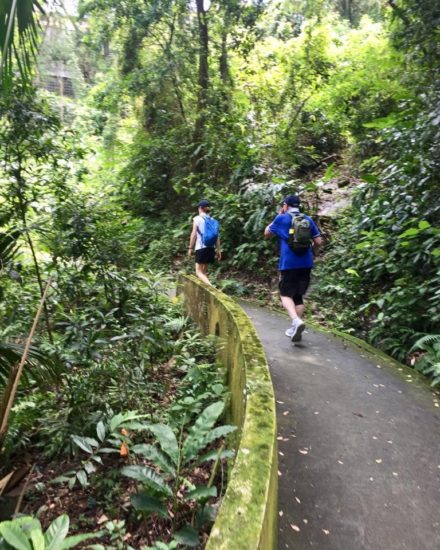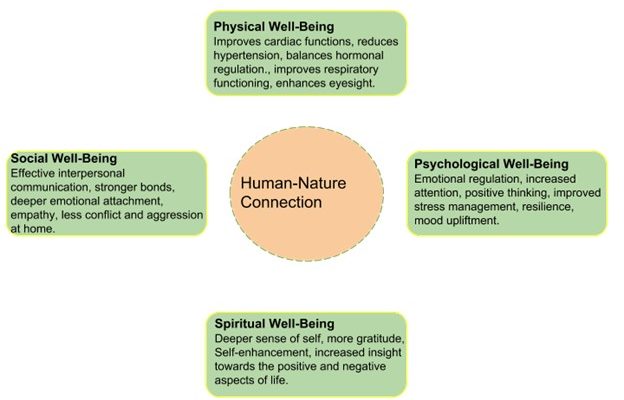Go Outside!
When I was young, my mother often recited the poem ‘Trees’ by Joyce Kilmer and I have always remembered the first two lines:
‘I think that I shall never see
A poem lovely as a tree’.
She was a dedicated fan of nature and relished what it did for her spirit.
We know from extensive research that there are innumerable psychological and physiological benefits of being in nature. The famous neurologist and author Oliver Sacks (1933– 2015) wrote: ‘As a writer, I find gardens essential to the creative process; as a physician, I take my patients to gardens whenever possible. All of us have had the experience of wandering through a lush garden or a timeless desert, walking by a river or an ocean, or climbing a mountain and finding ourselves simultaneously calmed and reinvigorated, engaged in mind, refreshed in body and spirit.
He referred to ‘Biophilia’, the love of nature and living things, as an essential part of the human condition. ‘Hortophilia’, the desire to interact with, manage, and tend nature, Sacks claimed, is part of all of us. We are now increasingly aware that nature influences our emotions, our bodies and our minds in positive ways.
We have lots of evidence that show symptoms of stress, anxiety and depression in the brain are reduced by being in green spaces. Measurements of muscle tension, blood pressure and levels of cortisol (a stress hormone), decrease. Nature also boosts endorphin levels and dopamine production, which both promote happiness. Walking in nature has been shown by researchers such as Shern et al., 2014 to boost mood. People also feel more motivated and energised. (Berman, Kross, Kaplan, 2012).
Being outside connecting with nature also:
- Gives us an injection of Vitamin B, called the ‘sunshine vitamin’, because we don’t get as much of it from food as we need. Vitamin B helps ward off cancer, diabetes, Alzheimer’s and osteoporosis.
- Improves creative thinking – it’s great for concentration and attention.
- Supports our ability to regulate our emotions.
- Improves our problem solving. Research published in ‘Landscape and Urban Planning’ found that working memory span improved and there is a decrease in anxiety from exposure to natural green space.
- Improves eyesight. Computer Vision Syndrome (CSV) is a condition that arises from staring at the screen for prolonged hours. This may result in conditions like dry eyes, myopia, or even chronic headaches. Grass, trees, flowers and other aspects of the environment help prevent this.
Sir David Attenborough, an internationally respected naturalist and presenter says that: “We must cherish the natural world because we’re a part of it and we depend on it.”
Walk!
We know walking is good for our hearts, muscles and our metabolic rate. It boosts our emotional states, too, as proven by Stanford University scientists. They identified that walking in green spaces increased attention and focus, more than for people who used a treadmill or walked in urban settings. Teenagers who walk have less obesity, asthma, anxiety and depression. They also cope better than their peers. Thinking becomes less negative when we spend time outside.
If you just cannot dedicate time to being outside, surround yourself with indoor plants. Research shows these improve sensory awareness, cognitive functions, and sharpen focus. They reconnect us to nature and help us feel calm.
So, challenge yourself this summer. BE ACTIVE as our ‘Five Ways to Wellbeing’ model advocates. Commit to being outside surrounded by nature and see how much better it helps you feel. Go for a walk or run. Cycle. Play a game. Garden. Dance.
There’s a beautiful world out there. Go discover it.
References
10 Ways Nature Helps Your Well-Being – Suzanne Kane
https://psychcentral.com/blog/10-ways-nature-helps-your-well-being/
How Nature Supports Teen Mental Health
https://www.newportacademy.com/resources/mental-health/how-nature-supports-teen-mental-health/
Mental health benefits of the outdoors
https://www.ontarioparks.com/parksblog/mental-health-benefits-outdoors/
Sour mood getting you down? Get back to nature
https://www.health.harvard.edu/mind-and-mood/sour-mood-getting-you-down-get-back-to-nature
The Positive Effects Of Nature On Your Mental Well-Being
https://positivepsychology.com/positive-effects-of-nature/
Why does a connection with nature improve well-being?
https://insideecology.com/2018/09/19/why-does-a-connection-with-the-rest-of-nature-improve-well-being/







